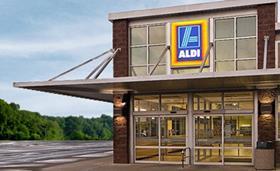
Aldi sales rose by 13.5 per cent during the last year while profits were hit by ongoing investment into price and new stores, the company has announced.
The figures, for the year to 31 December 2016, showed sales grew faster than the year before, where they were up 12 per cent. Sales and market share have now more than doubled in less than four years, Aldi said.
Operating profit fell by 17 per cent at the discounter, a drop attributed by Aldi to its “commitment to the lowest prices in the UK”. It also said its investment in people, stores and distribution “remains undiminished but impacts profits”.
During the last year, over one million shoppers switched from other supermarkets with sales growth resulting in an extra £1 billion in spend, Aldi said.
CEO Matthew Barnes said: “Our growth is accelerating, thanks to the hundreds of thousands of new customers switching their shop to Aldi. This is happening right across the UK and is all down to a simple, straightforward commitment – products comparable to the leading brands and supermarket premium ranges at the lowest prices in Britain.
“We’re doing everything we can to insulate customers from those cost increases, making sure our prices are the lowest in the UK, every day of the year.”
Best-performing categories during the year included fruit and veg, as well as fish, meat and Aldi's Specially Selected premium lines, which are so far up 40 per cent in sales this year.
The company said a further 150 stores would open next year under its ‘Project Fresh’ initiative – a £300m investment programme to create more space for fresh, chilled and food-to-go ranges as well as simpler layouts, improved fixtures and wider aisles. By the end of 2018, a total of 250 stores will have launched in the new format.
Aldi’s current growth rate in the UK is now 15.6 per cent, according to Kantar Worldpanel data, and the supermarket also said like-for-like sales were “strongly positive” during 2016, and have accelerated in 2017.
Future capital expenditure plans are “entirely unaffected” by the UK’s decision to leave the EU, the company confirmed, adding that it expects to invest £459m during 2017.



